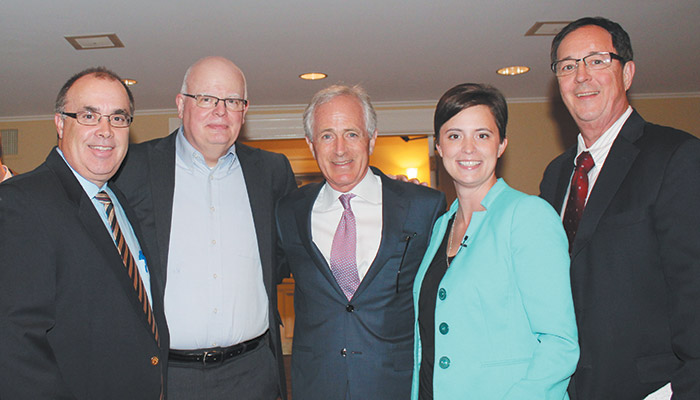
NASHVILLE (BP) — “The United States of America needs to use its moral leadership to end modern slavery around the world,” U.S. Sen. Bob Corker said to applause at a “Night of Hope Nashville” on ending human trafficking.
 Twenty-seven million people around the world are living in slavery because of human trafficking, “more than at any time in our world’s history,” Corker told 300 people in attendance at First Baptist Church of Donelson in Nashville.
Twenty-seven million people around the world are living in slavery because of human trafficking, “more than at any time in our world’s history,” Corker told 300 people in attendance at First Baptist Church of Donelson in Nashville.
To address human trafficking in the United States, a law was passed in 2015 to help law enforcement identify traffickers who are using the Internet, Corker said.
Additionally, to coordinate efforts by groups across the world, a nonprofit entity based in Washington, D.C., will be started. Plans are for funding of about $50 million to be appropriated through legislation by the end of this year, Corker announced.
HIV and polio have been basically eradicated and slavery can be too, the senator said.
“I am elected by you to try to solve problems and it is a huge privilege to do what I do…. It’s such an honor to come into contact with people like you who would come out on a night like this from across the community to be a part of this. …
“I don’t know of anything from a secular sense that makes people feel more whole than to give of themselves to help make another person’s life better.”
Corker said he has seen signs of human trafficking, which is the modern form of slavery, in the many foreign countries he visits in his work as chairman of the U.S. Senate Committee on Foreign Relations. The issue was brought to his attention by his chief of staff, Todd Womack of Chattanooga.
“Slavery is a crime of opportunity” perpetrated mostly by small business people, despite the fact that every country in the world has outlawed slavery, Corker said.
“Poor people don’t have access to justice,” he said, noting that criminal justice systems must be strengthened in other countries and in our own.
Of the 27 million people enslaved in the world, 12 million are in India alone, Corker said. Twenty-four percent are enslaved today in sex trafficking while 76 percent are in hard day labor.
Also speaking at the Night of Hope gathering were Rusty Sumrall, director of missions for the Nashville Baptist Association, Joe Sorah of the Tennessee Baptist Convention staff. The meeting was sponsored by the NBA and TBC.
“We believe that the church is in a unique place to engage needy people,” Sumrall said. “It is a dream of our missions committee of the Nashville Baptist Association that a year from now we would have a coalition of churches working together in the Nashville area to help fight trafficking….”
Sorah, compassion ministries specialist for the TBC, said 26 percent of those being trafficked worldwide are children, and on an average of every two minutes a child “is bought or sold for sex.” The average age of one of those children is 13. In the U.S. human trafficking is being conducted in every state, Sorah said in voicing his hope that “we as a church would wake up to the plight of human trafficking.”
Jesus in Matthew 18 and in Luke 15 directs people to honor and protect children, warns them of the consequences of not doing so, and tells people to help those who need shepherding, Sorah noted. In the parable of the lost sheep Jesus tells of a shepherd who leaves his other sheep to find the one who was lost.
“The strong implication there is [that] the shepherd, Jesus, goes to find that one that has been taken away. And if we call ourselves followers of our Jesus Christ we will do the ministry that our Savior did — we will go find the one that’s been led astray, that’s been captured.”
Ashleigh Chapman, president of the Alliance for Freedom, Restoration and Justice, a nonprofit organization, told the gathering, “It’s not rocket science to fight against powers that betray souls. It just requires an awakening by us as individuals and us as a church…,” she said.
Human trafficking is hard to discover even by government agencies so she provides help in locating the criminals and victims. In Kansas where she assisted officials, the cases of human trafficking rose from two a year to about 400 victims in several years.
Helping prevent human trafficking might be as simple as church members helping children in foster care or assisting a single mother so she does not leave her young girls at home by themselves. Or it might be as big as developing aftercare facilities, said Chapman, who is an attorney.
It also might involve getting to know a college student who admits that she is being forced to be a prostitute by a man who befriended her. He controls her by beating her and threatening her family.
Thankfully, church members as leaders of schools, governmental agencies, businesses and nonprofits are situated to help, Chapman said.
Churches and Christians still struggle with whether to preach the Gospel or serve the poor, she noted. They must follow the example of Jesus and do both, because “He always did both, always,” she declared.
She also referred to the first verse Jesus read aloud in the synagogue as He began His public ministry — “The Spirit of the Lord is on Me, because He has anointed Me to preach good news to the poor. He has sent Me to proclaim freedom to the captives and recovery of sight to the blind, to set free the oppressed, to proclaim the year of the Lord’s favor” (Luke 4:18, HCSB).
The Engage Together initiative of the Alliance for Freedom, Restoration and Justice has developed curriculum to help churches address human trafficking, Chapman said. Nashville-area training for churches to become involved will be offered on Saturday, Nov. 12, at Westview Baptist Church in Kingston Springs. For more information, contact [email protected].














